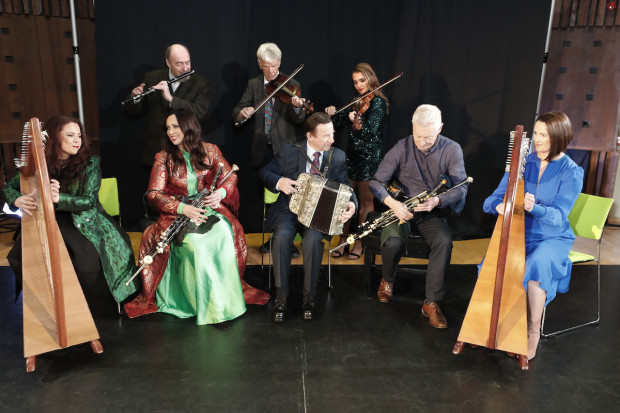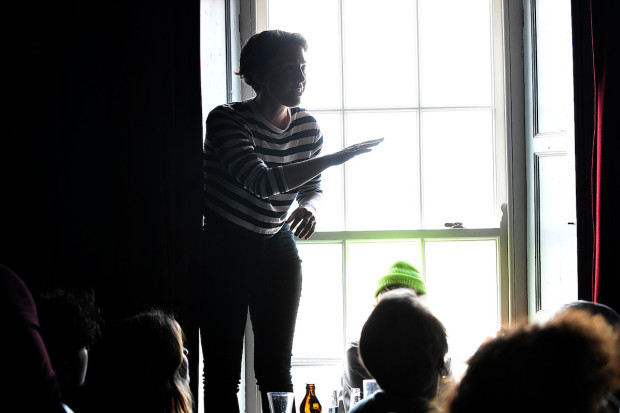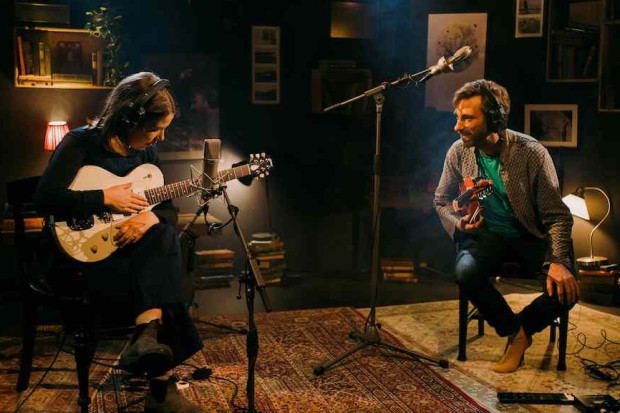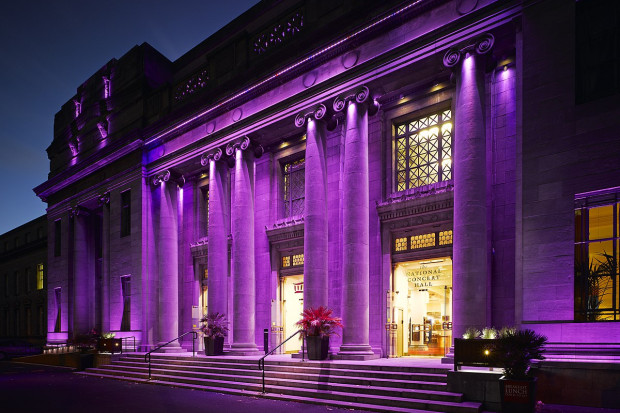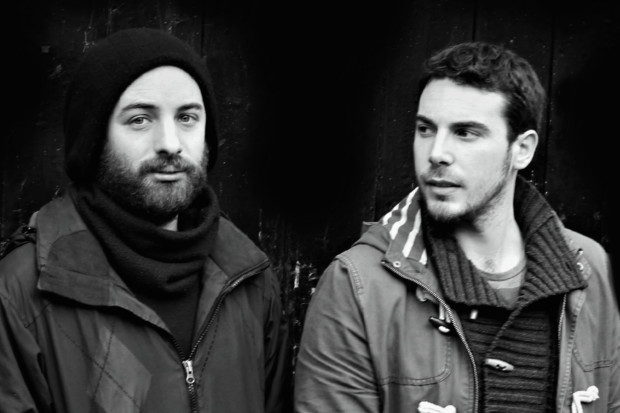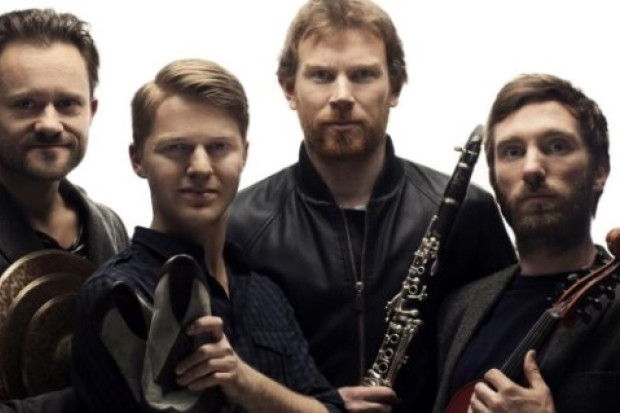Live Reviews: Temple Bar Trad 2006, Festival Concerts – Thursday & Friday
Various venues, Temple Bar, Dublin,
26-29 January 2006
Although Dublin has the greatest concentration of traditional musicians in the country, Temple Bar Trad, which took place over the last weekend in January, was the first broad-based festival of traditional music held in the capital for possibly decades. Programmed by Finbar Boyle, several of the artists chosen were those who have surprised the traditional music listenership in recent years with a recording that has gone against the grain.
The duo of piper Mick O’Brien and fiddle-player Caoimhín Ó Raghallaigh, who opened the festival in the Temple Bar Music Centre, are a good example. Their Kitty Lie Over CD in 2003 rose to the top for the striking momentum in duet playing they were able to create, but also for showcasing the musicianship of the young Ó Raghallaigh (O’Brien’s reputation as a musician had been established well before), whose solo performances have often successfully stretched the popular aesthetics of traditional music. Mick O’Brien is the solid half of the partnership, holding the fort, obeying the structure of the tune, allowing adventurous fiddle wander around the melody with double-stops and improvisations. Beginning with a very original-sounding set which combined subtle tin whistle and absorbing, resonant hardanger fiddle, they then switched to pipes and regular fiddle. Tuning in to them individually was enjoyable, as ever, but although a single return to the tin whistle/hardanger combination was just as successful, as a duet they appeared to struggle to sum up the magic that made Kitty Lie Over so impressive.
An entirely solo Noel Hill followed. A musician who has set the standard for concertina playing for almost thirty years now, the expectations of the listenership would naturally be high, and while Hill certainly impressed, it was as if for the first few sets he was still only trying to warm up – literally, for he admitted he had been ‘frozen’ in the dressing room. But should that be the audience’s concern?
By the last set, and three reels beginning with that captain of a tune, ‘Dr Gilbert’s’, the magic finally appeared to be released, and one could feel the entire audience shift forward on their seat. Hill can inject a degree of intensity into a tune that sets him, and just a few others, apart as the masters of their generation. But by then it was arguably too late, and that moment of magic was what we were left to ponder as the half-time cattle rush to the bar began.
The performance of Skara Brae –Tríona, Maighréad and Mícheál Ó Domhnaill, and Daithí Sproule – who recorded one album in 1970, described by Finbar Boyle on stage as ‘one of the most beautiful albums of traditional music’, and which Boyle brought together again for this special night, was actually the most enjoyable part of the evening. Full of heart, warmth and demonstrating magnificent pitching with regular four-part harmony, it was a jubilant coming together for the four. Maighréad Ní Domhnaill’s singing soared throughout, while the tightness of the arrangements made one wonder if they hadn’t been reuniting much more regularly than we’re given to understand…
Fun and all as it is to have a bar open throughout a concert, the exiting of ‘listeners’ for a drink at even the slightest lull in a performance (i.e. a pause between tunes, a slow air…!) was distracting. While a band performance may just be able to bear it, solo and duet playing is just too subtle to compete. The Bank of Ireland Arts Centre on Friday evening was therefore a more successful venue.
Based in Cork, Seamus Creagh and Aidan Coffey played music drawn partly from the Sliabh Luachra tradition. Both have very precise styles of playing, and the particular power in their music, when it works, comes from the intensity that comes with close, note-for-note playing. They began powerfully with a set of jigs that achieved just that, and managed to hit that mark regularly throughout, with Sliabh Luachra slides and polkas in particular, whose rhythm they seemed to be more comfortable with. Despite music that was absorbing, however, endless chatting by several couples throughout the first half made me wonder if they might have done more in the way of introductions to put their stamp on the evening. As is regularly the case with traditional instrumental music, the consistently short, dry introductions (type of tune, name of tune, learnt it from, etc.), does not generally engage.
No such liberties were taken by the audience with Fermanagh singer Rosie Stewart, TG4 traditional singer of the year award in 2003. Singing solo, introducing her songs with wit and charm, the audience were captured entirely for the bones of an hour. Like Maighréad Ní Dhomhnaill in Skara Brae, there are natural (and once heard, unforgettable) qualities to Stewart’s voice which give any performance additional depth and emotion. Moving through a great range of songs, in mood and expression, from the striking ‘Rosalita and Jack Campbell’, a song about a drive-by killing on the Ormeau Road in Belfast, to the fun ‘Down Our Street’, Stewart left a lasting impression.
Having moved to Sligo recently, fiddle-player Gerry Harrington has become eighty-year-old flute-player Peter Horan’s musical partner and the pair have recently released a quite unique CD, Fortune Favours the Merry. Horan is considered a legend in traditional music and it was clear that Harrington was soaking up his music on stage. The octogeniarian perhaps surprised everyone by demonstrated considerable power in his playing, and Harrington too, as the evening went on, allowed himself more and more vigour and adventure in his fiddle playing.
If Harrington was the solid half in this partnership, Horan is constantly harrying and chasing with his flute-playing, demonstrating all the energy of the Sligo style. While Ollie Ross’ piano accompaniment added much to the evening, the under-rehearsal was hard to ignore. With several sets, Ross had to go searching for the change of key, and as the evening went on I grew less and less patient with that thirty seconds of harmonic no-man’s-land.
For children, Len Graham and John Campbell’s song and storytelling hour on Saturday in the Ark Children’s Theatre was hugely successful, demonstrating to many parents – who often sang louder than the children! – the importance of learning good, simple songs to sing to and with their children. While this was a well-chosen part of the programme, an opportunity was also missed – for any parent that wished their children to experience a traditional music session in Temple Bar before or after the Ark at 3pm, incredibly there wasn’t one single session taking place.
Apparently, there are already plans for a repeat of the festival next year. The decision to choose mainly instrumental soloists, duets and trios set Temple Bar Trad apart from many traditional music festivals which cling to the big band. It was certainly a successful inauguration, given that three of the four main concerts were sold out, although the ‘session trail’ was hardly all it said it would be. However, with workshops by fiddler Jesse Smith and flute-player Harry Bradley, Idir na Línte (a play in Irish for 7-10 year olds), and the Irish culture workshops held by Gaelchultúr, there’s a very fine basis upon which to build for 2007.
Published on 1 March 2006
Toner Quinn is Editor of the Journal of Music. His new book, What Ireland Can Teach the World About Music, is available here. Toner will be giving a lecture exploring some of the ideas in the book on Saturday 11 May 2024 at 3pm at Farmleigh House in Dublin. For booking, visit https://bit.ly/3x2yCL8.












